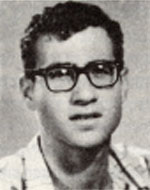Zimmerman, Moshe
Moshe, son of Sima and Nathan, was born on January 16, 1953 in Haifa. He completed his elementary studies at the “Reali” school in Haifa. Afterward, he completed his high school studies in the biological track. “Moshiko”, as his friends and family called him, was an outstanding student throughout his studies, and even graduated with honors. His teachers and classmates loved him because he was quiet and modest, serious, honest and dedicated. He was a member of the Scouts youth movement and of Maccabi Haifa, where he practiced swimming, weightlifting and karate training. Moshe mainly liked swimming and took a course in amateur rescuers. He was a conservative guy with good manners. He never yelled at anyone, he was honest, he never lied, and so he believed everyone. His friends trusted him and knew he could be told secrets and poured out his heart. He was kind and willing to help anyone. He never thought of evil, of quarrel or of speaking against a man behind his back. By nature, he was humble, not arrogant to anyone, and made no one feel uncomfortable or inferior. He judged people according to their nature and virtues, and not according to their origin or status, and therefore many respected him and wanted his friendship. His relationship with his family was unique, with mutual respect and appreciation. He loved his parents and respected them. Moshe was drafted into the IDF in mid-August 1971 and was assigned to the Artillery Corps, where he was assigned to serve in the unit on the Golan Heights as a technical technician. Moshe took his duties seriously and his commanders, who knew his skills, promoted him in command positions on the platoon. During his service as a tecnical sergeant, his vision was impaired, and he could request a transfer to a rear unit. But he rejected the idea firmly, out of faith and acceptance of the duty to serve in his position and combat unit. He was organized and realistic, respectful of order and discipline, and was careful about his platoon. Therefore, his platoon was one of the organized in the battalion. But together with the concern for discipline Moshe knew how to take care of his soldiers, even more than he took care of himself. Any soldier who encountered difficulty knew that he could turn to Moshe and he knew how to do what was necessary. In his spare time, Moshe was much more self-absorbed and was deeply interested in reading books. He liked mathematics in particular, and knew how to combine his knowledge with the needs of his job. He spent the entire period of his service in the Golan Heights. About two months before Yom Kippur his commanders wanted to raise him to the rank of sergeant and appoint him to be responsible for technical changes in the entire battalion, but his direct commander in the rampart refused, because he did not want to lose someone as devoted and talented as he was. Moshe waited for his release from the army in order to return to civilian life, to study at the university, and to establish his future. During the Yom Kippur War, Moshe took part in the battles in the Golan Heights. On the 7th of Tishrei 5740 (7.10.1973), in a tank attack in the area of Nahal Gesur, he was injured and when he was transferred to the rear, he was hit again by enemy fire and killed. He was laid to rest in the military cemetery in Haifa. Survived by his parents, brother and sister. After his fall, he was promoted to First Sergeant. In a letter of condolence to the bereaved family,
